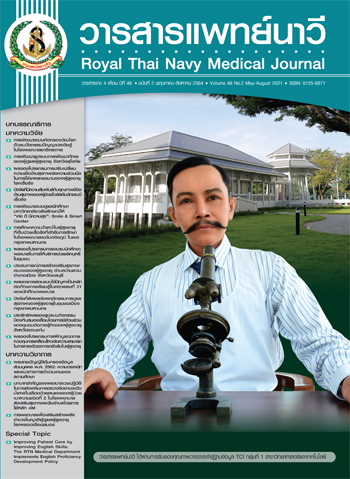ผลของโปรแกรมการปรับเปลี่ยนความเชื่อด้านสุขภาพต่อความร่วมมือในการใช้ยาหลายขนานของผู้สูงอายุโรคเรื้อรัง
Main Article Content
บทคัดย่อ
การวิจัยครั้งนี้เป็นการวิจัยกึ่งทดลองแบบวัดผลหลังการทดลองมีกลุ่มเปรียบเทียบ โดยมีวัตถุประสงค์เพื่อศึกษาผลของโปรแกรมการปรับเปลี่ยนความเชื่อด้านสุขภาพต่อความร่วมมือในการใช้ยาหลายขนานของผู้สูงอายุโรคเรื้อรัง เลือกกลุ่มตัวอย่างแบบเจาะจง จำนวน 40 คน แบ่งออกเป็น 2 กลุ่ม คือ กลุ่มทดลองและกลุ่มควบคุม กลุ่มละ 20 คน โดยจับคู่ให้มีคุณสมบัติคล้ายคลึงกันในด้านอายุและระดับการศึกษา กลุ่มทดลองได้รับโปรแกรมการปรับเปลี่ยนความเชื่อด้านสุขภาพ เป็นระยะเวลา 5 สัปดาห์ กลุ่มควบคุมได้รับการพยาบาลตามปกติ เครื่องมือที่ใช้ในการเก็บข้อมูล ได้แก่ แบบบันทึกข้อมูลส่วนบุคคล แบบบันทึกความร่วมมือในการใช้ยาหลายขนานจากการนับเม็ดยา มีค่าความเที่ยงระหว่างผู้ประเมิน (Inter-rater reliability) เท่ากับ 1 วิเคราะห์ข้อมูลโดยใช้สถิติพรรณนาและสถิติทดสอบค่าซี
ผลการวิจัย พบว่า สัดส่วนของความร่วมมือในการใช้ยาหลายขนานของผู้สูงอายุโรคเรื้อรังกลุ่มที่ได้รับโปรแกรมการปรับเปลี่ยนความเชื่อด้านสุขภาพมากกว่ากลุ่มที่ได้รับการพยาบาลตามปกติ อย่างมีนัยสำคัญทางสถิติที่ระดับ .05 ผลการวิจัยนี้แสดงให้เห็นว่า การปรับเปลี่ยนความเชื่อด้านสุขภาพ สามารถส่งเสริมความร่วมมือในการใช้ยาหลายขนานของผู้สูงอายุโรคเรื้อรังได้ ดังนั้นโปรแกรมการปรับเปลี่ยนความเชื่อด้านสุขภาพ สามารถนำไปใช้เป็นแนวทางในการดูแลผู้สูงอายุโรคเรื้อรัง เพื่อให้มีความร่วมมือในการใช้ยาเพิ่มขึ้น
Article Details

อนุญาตภายใต้เงื่อนไข Creative Commons Attribution-NonCommercial-NoDerivatives 4.0 International License.
เอกสารอ้างอิง
United Nations. World population ageing 2019: highlights. [Internet]. [cited 2020 September 8]. Available from: https://www.un.org/en/development/desa/population/publications/pdf/ageing/WorldPopulationAgeing2019-Highlights.pdf.
Foundation of Thai Gerontology Research and Development Institute. Situation of the Thai elderly 2018. Bangkok: Printery; 2018. (in Thai).
Aekplakan W. Thai National Health Examination Survey, NHES V. Nonthaburi: Health Systems Research Institute (HSRI); 2014. (in Thai).
Tepsuriyanont S, Jirapaet V, Luangamornlert S, Praditsuwan R. Relationship between regimen complexity and medication adherence behavior in Thai elderly with hypertension. Chula Med J 2011;55(5):457-72. (in Thai).
Gnjidic D, Hilmer SN, Blyth FM, Naganathan V, Waite L, Seibel MJ, et al. Polypharmacy cutoff and outcomes: five or more medicines were used to identify community-dwelling older men at risk of different adverse outcomes. J Clin Epidemiol 2012;65(9):989-95.
Vatcharavongvan P, Puttawanchai V. Polypharmacy, medication adherence and medication management at home in elderly patients with multiple non-communicable diseases in Thai primary care. Family Medicine & Primary Care Review 2017;19(4):412-6.
Buakhwan W. Roles of pharmacist in geriatric medication management at Ban Bang Khae welfare development center for older persons. [Master’s Thesis, Faculty of Phamaceutical Sciences]. Chulalongkorn University; 2015. (in Thai).
Osterberg L, Blaschke T. Adherence to medication. N Engl J Med 2005;353(5):487-97.
Saxon SV, Perkins EA, Etten MJ. Physical change and aging: a guide for the helping professions. 6th ed. New York: Springer; 2015.
Maher RL, Hanlon JT, Hajjar ER. Clinical consequences of polypharmacy in elderly. Expert Opin Drug Saf 2014;13(1):10.1517/14740338.2013.827660.
Yap AF, Thirumoorthy T, Kwan YH. Medication adherence in the elderly. Journal of Clinical Gerontology and Geriatrics 2016;7(2):64-7.
Zelko E, Klemenc-Ketis Z, Tusek-Bunc K. Medication adherence in elderly with polypharmacy living at home: a systematic review of existing studies. Mater Sociomed 2016;28(2):129-32.
Lai X, Zhu H, Huo X, Li Z. Polypharmacy in the oldest old (≥80 years of age) patients in China: a cross-sectional study. BMC Geriatrics 2018;18(1):64.
Yap AF, Thirumoorthy T, Kwan YH. Systematic review of the barriers affecting medication adherence in older adults. Geriatr Gerontol Int 2016;16(10):1093-101.
Shruthi R, Jyothi R, Pundarikaksha HP, Nagesh GN, Tushar TJ. A study of medication compliance in geriatric patients with chronic illnesses at a tertiary care hospital. J Clin Diagn Res 2016;10(12):FC40-FC43.
Jin H, Kim Y, Rhie SJ. Factors affecting medication adherence in elderly people. Patient Preference and Adherence 2016;10:2117-25.
Rungsawang S. Factors related to polypharmacy medication adherence among older persons with chronic illness. Journal of Nursing, Siam University 2017;18(35):6-23. (in Thai).
Manadee C, Ploylearmsang C, Sookaneknun P. Effects of elderly care with chronic diseases on quality use of medicine at home in area of sub-district health promoting hospitals, Somdet district, Kalasin province. IJPS 2014;10(3):354-71. (in Thai).
Kumpiriyapong N, Sasat S. The effect of health belief programme on medicine used behavior in older persons with hypertension. Royal Thai Navy Medical Journal 2017;44(3):67-83. (in Thai).
Rosenstock IM, Strecher VJ, Becker MH. Social learning theory and the health belief model. Health Educ Q 1988;15(2):175-83.
Burns N, Grove SK. The practice of nursing research: appraisal, synthesis and generation of evidence. 6th ed. St. Louis, Mo: Elsevier Saunders; 2009.
Collin C, Wade DT, Davies S, Horne V. The Barthel ADL Index: a reliability study. International Disability Studies 1988;10(2):61-3.
Jitapankul S. Principles of geriatric medicine. 3rd ed. Bangkok: CU Print; 2001. (in Thai).
Institute of Geriatric Medicine. MMSE-Thai 2002. Bangkok: Ministry of Public Health; 2002. (in Thai).
Sakthong P, Sonsa-Ardjit N, Sukarnjanaset P, Munpan W, Suksanga P. Development and psychometric testing of the medication taking behavior tool in Thai patients. Int J Clin Pharm 2016;38(2):438-45.
Woodham NS. Intelligent pill box to improve medical adherence in elderly with hypertension: a randomized controlled trial. [Doctoral Dissertation, College of Public Health Sciences]. Chulalongkorn University; 2017. (in Thai).
Brown MT, Bussell JK. Medication adherence: WHO cares? Mayo Clinic Proceedings 2011;86(4):304-14.
Promjame S, Kespichayawattana J. The effect of health belief model program on complication preventive behavior in hypertensive older persons. Royal Thai Navy Medical Journal 2018;45(3):561-77. (in Thai).
Zamani N, Ahmadi Tabatabaei SV, Khanjani N, Fadakar Davarani MM. The effect of educational intervention based on the health belief model on medication adherence among patients with diabetes referred to a diabetes Center in Zarand, Kerman. Journal of Health and Development 2017;6(2):97-109.


